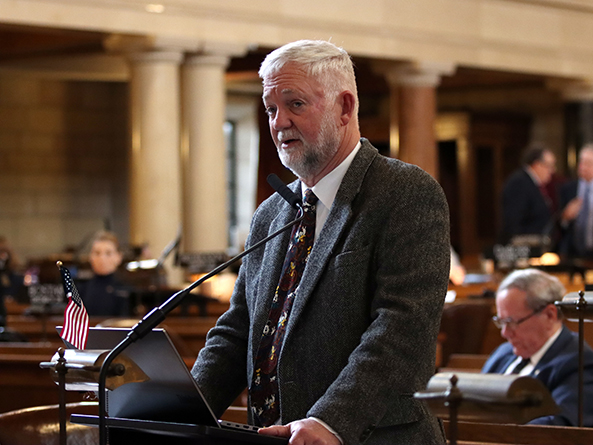Session Review: General Affairs
Measures to update amusement device regulations and address the accessibility of vaping devices and co-branded alcoholic beverages were among those advanced by the General Affairs Committee this session.
LB685, introduced by Kearney Sen. John Lowe, imposes a 5% annual tax on the net operating revenue of each mechanical amusement device in the state. Fraternal organizations are exempt and the revenue generated from the tax will be distributed as follows:
● 40% to the Property Tax Credit Cash Fund;
● 25% to the county where the device is located for distribution between the county and municipality;
● 20% to the Charitable Gaming Operations Fund to carry out the bill’s provisions.
● 10% to the Nebraska Tourism Commission Promotional Cash Fund;
● 2.5% to the state General Fund; and
● 2.5% to the Compulsive Gamblers Assistance Fund.
Beginning Jan. 1, 2025, the bill requires an annual licensing fee of $5,000 for manufacturers of mechanical amusement devices and $100 per device, up to $5,000, for distributors.
In addition, a retail establishment offering cash amusement devices is required to generate at least 60% of their gross operating revenue from other sources. The state tax commissioner is responsible for establishing a central server to receive accurate revenue and income reporting from cash devices across the state. Once the server is operational, each cash amusement device must be connected to it at all times.
LB685 also raises the age to play a mechanical amusement device from 19 to 21.
The bill includes provisions of LB836, also introduced by Lowe, which prohibit co-branded alcoholic beverages from being sold immediately adjacent to any non-alcoholic food or drink portraying cartoons or “youth-oriented images.” The bill defines a co-branded alcoholic beverage as one that contains the same or similar brand name, logo or packaging as a non-alcoholic beverage.
Businesses with less than 2,500 square feet of retail space are exempt from the provision but must display a clearly visible sign stating that the co-branded beverage contains alcohol and can be purchased only by persons who are 21 years of age or older.
LB685 passed on a 46-0 vote.
Several provisions of state law governing liquor, gaming and vaping were updated under LB1204, introduced by Omaha Sen. John Cavanaugh. The bill defines a rickhouse under the Nebraska Liquor Control Act and allows the holder of a microdistillery or spirits license to operate a rickhouse if authorized by the Nebraska Liquor Control Commission.
The bill includes provisions of three other measures, including Bellevue Sen. Rick Holdcroft’s LB981, which relates to compliance requirements for Charitable Gaming Lottery and Raffle applicants in Nebraska.
Previously, a nonprofit conducting a lottery or raffle was required to pay a quarterly tax on earnings if the lottery exceeded $1,000 in gross proceeds or the raffle exceeded $5,000.
LB981 adjusts the tax filing threshold for nonprofits to $15,000 in gross proceeds for both lotteries and raffles and limits qualifying nonprofit organizations to one lottery or raffle per calendar month that exceeds $15,000 in gross proceeds. The measure clarifies that organizations can conduct more than one lottery or raffle if their total gross proceeds do not exceed the threshold.
Provisions of LB1000, introduced by Plymouth Sen. Tom Brandt, prohibit the Charitable Gaming Division and any lottery contractor from disclosing the identity of a person awarded a prize of $250,000 or more except upon written authorization by the prize winner.
Also included in the bill is a measure intended to reduce access to vaping devices by minors in Nebraska.
LB1296, sponsored by Sen. Jana Hughes of Seward, prohibits the online sale and delivery of electronic nicotine delivery systems directly to consumers in Nebraska, but does not prohibit a retailer from accepting online orders to be picked up at their licensed retail facility.
Among other provisions, the measure also:
● requires licensure or certification by wholesalers, retailers and manufacturers of ENDS products;
● requires manufacturers to pay a $75 certification fee for each type or model of ENDS product sold in the state;
● prevents the use of packaging and labeling that mimics other consumer products or conceals a vaping device;
● requires manufacturers to attest that they fully comply with federal disclosure requirements; and
● prohibits overseas manufacturers from selling products to retailers and distributors in Nebraska unless they are certified under the bill’s provisions.
LB1204 passed on a 45-0 vote.
A bill seeking to help certain potential establishments in Nebraska obtain liquor licenses under the Nebraska Liquor Control Act did not advance from committee.
Under LB1276, introduced by Gordon Sen. Tom Brewer, a city or village clerk who is informed of a protest to the issuance of a proposed license prior to the applicants’ purchase of land for the construction of the establishment, or the renovation of an existing property, could have submitted a request to the Nebraska Liquor Control Commission to waive the 45-day objection period and hold a hearing on the issuance of a license.
The commission then could have held a hearing and ruled on the issuance or denial of the license on the basis of the applicant submitting the business plan for a future establishment.
The bill would have applied only to applicants for retail, bottle club, craft brewery or microdistillery licenses in second class cities and villages.


